6-year MD – INFORMATION AND RULES OF THE COURSE
HISTOLOGY
Information and rules of the course (MD)
1. The course consists of lectures (e-learning) and laboratories covering the topics presented in the lectures.
• lectures in the form of e-learning are sequentially posted on the Pegaz remote teaching platform of the university, logging via Central Login of the Jagiellonian University;
• laboratories (in the microscopic lab rooms of the Department of Histology): under the teacher’s supervision, the student uses a light microscope and watches electron micrographs learning how to identify and correctly interpret the microscopic images of tissues and organs.
2. Participation in laboratories is obligatory.
The student should get credit for every lecture by correctly answering short MCQ quizzes presented after each part of the lecture on the Pegaz platform.
During the laboratories the student should have the knowledge concerning the topics of the laboratory, verified by a short quiz or questions. In case of insufficient results, a short supplementary exam can be required to get the laboratory credit. Getting credit for the course requires credits for all laboratories.
Maximum four laboratory absences are allowed (make up is required). Students who exceed the allowed number of four laboratory absences fail to get the course credit with all consequences resulting from the JU MC study rules.
3. The mid-semester MCQ exam (80 questions, >50% pass level), covering the material concerning the cell and the tissues (Cell & Tissues exam) will be held according to the syllabus. Only students who get credits for lectures and laboratories devoted to cell and tissues will be allowed to take that exam.
The students who fail the exam will be allowed to retake it in about two weeks time. In case of failure, the second (and final) retake will be possible before the final exam.
In order to get the course credit and to be allowed to take the final exam, the student has to:
• not exceed the limit of 4 laboratory absences,
• get credit for all laboratories
• get credit for all lectures (e-learning)
• pass the Cell & Tissues exam.
Students who fail the second retake of the Cell & Tissues exam will not be allowed to participate in the first take of the final exam and, according to the study rules, they will take the final exam only once (final exam retake), under the condition that they repeat again and pass the retake of the Cell & Tissues exam. Students who fail will not get the course credit.
4. The final exam consists of two parts: practical and theoretical. Successful completion of the course requires passing both parts.
(a) the practical (laboratory) part, covering the whole material of the labs: identification of cells/tissues/organs and their specific structures in 13 microscopic slides/micrographs and 2 electron micrographs. This part is evaluated on the pass/fail basis, pass level 8 pts.
(b) the theoretical part (MCQ, 100 questions, >50% pass level), covering the material concerning histology of systems and organs. Grades obtained will count as the exam grades.
• Students who passed the Cell & Tissues exam at first take with the grades “good” or “good plus” (4.0 or 4.5) but who passed the final exam with the lower grade (3.0; 3.5 or 4.0) will have their grades elevated by 0.5; students who passed the Cell & Tissues exam with the grade “very good” (5.0) will have their grades elevated by 1.
• Students who showed excellent performance at the laboratory part (result 14-15) will have their grades elevated by 0.5. Elevation of the grade will also be awarded for excellent results of the weekly quizzes (see next section).
Students who fail any part of the exam will be allowed one retake of the failed part. The above grade elevations can be applied only in case of passed theoretical exam and are not valid for the retake exam.
Histology requires continuous learning. Participation in a lab (analysis of microscopical slides and electron micrographs) without at least basic knowledge of its subject makes no sense, since you will not know what you are looking at and nothing will remain in your memory. An attempt to learn a large material in a short time (a common “stop and go” way of learning – lazy weeks followed by hectic work just before mid-semester test or exam) usually leads to disastrous results. Moreover, knowledge gained in such a way is very unreliable – you forget almost all in a short time (some students call it „LPF-type learning”: Learn-Pass-Forget).
To provide motivation for continuous learning, starting from the lab devoted to epithelial tissue, the lab will begin with a short MCQ type quiz (10 questions, 5 minutes) covering the basic problems of the subject. An average of ≥80% during the year will result in elevation of the grade by 0.5 at the final exam (if passed).
5. All decisions concerning the course are in the competence of the Course Coordinator.
The recommended textbook:
Mescher: Junqueira’s Basic Histology: Text and Atlas. 14th ed., 2015 or later
Optional:
Gartner: Textbook of Histology. 5th ed. 2021 Elsevier
Pawlina: Histology. A text and Atlas 8th ed. 2020; Wolters Kluwer
Rules of good academic behavior
In the Jagiellonian University academic community, there are certain behavioral norms that are expected to be followed during lectures, seminars, and laboratory sessions. These include being punctual, avoiding loud conversations, whistling or singing, and refraining from demonstrative yawning.
It is also considered impolite to engage in activities such as eating or having conversations on smartphones during class. Additionally, it is generally not acceptable to wear caps unless it is for religious reasons or due to medical indications.
| |
Exams instructions and important information
|
|
|

